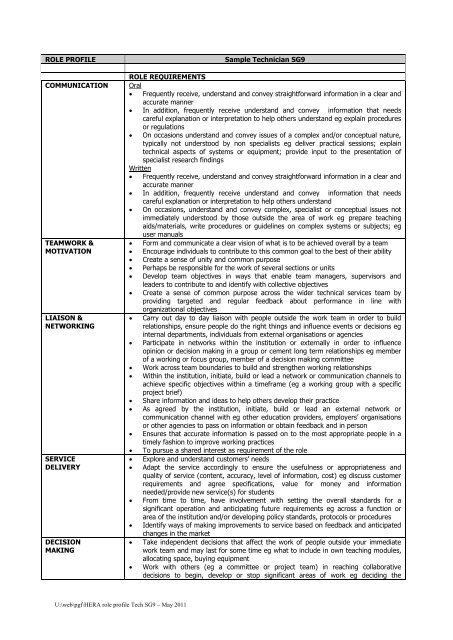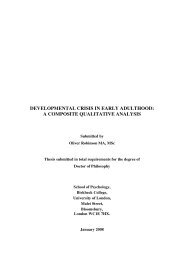ROLE PROFILE Sample Technician SG9 ROLE REQUIREMENTS ...
ROLE PROFILE Sample Technician SG9 ROLE REQUIREMENTS ...
ROLE PROFILE Sample Technician SG9 ROLE REQUIREMENTS ...
You also want an ePaper? Increase the reach of your titles
YUMPU automatically turns print PDFs into web optimized ePapers that Google loves.
<strong>ROLE</strong> <strong>PROFILE</strong><br />
COMMUNICATION<br />
TEAMWORK &<br />
MOTIVATION<br />
LIAISON &<br />
NETWORKING<br />
SERVICE<br />
DELIVERY<br />
DECISION<br />
MAKING<br />
<strong>Sample</strong> <strong>Technician</strong> <strong>SG9</strong><br />
<strong>ROLE</strong> <strong>REQUIREMENTS</strong><br />
Oral<br />
Frequently receive, understand and convey straightforward information in a clear and<br />
accurate manner<br />
In addition, frequently receive understand and convey information that needs<br />
careful explanation or interpretation to help others understand eg explain procedures<br />
or regulations<br />
On occasions understand and convey issues of a complex and/or conceptual nature,<br />
typically not understood by non specialists eg deliver practical sessions; explain<br />
technical aspects of systems or equipment; provide input to the presentation of<br />
specialist research findings<br />
Written<br />
Frequently receive, understand and convey straightforward information in a clear and<br />
accurate manner<br />
In addition, frequently receive understand and convey information that needs<br />
careful explanation or interpretation to help others understand<br />
On occasions, understand and convey complex, specialist or conceptual issues not<br />
immediately understood by those outside the area of work eg prepare teaching<br />
aids/materials, write procedures or guidelines on complex systems or subjects; eg<br />
user manuals<br />
Form and communicate a clear vision of what is to be achieved overall by a team<br />
Encourage individuals to contribute to this common goal to the best of their ability<br />
Create a sense of unity and common purpose<br />
Perhaps be responsible for the work of several sections or units<br />
Develop team objectives in ways that enable team managers, supervisors and<br />
leaders to contribute to and identify with collective objectives<br />
Create a sense of common purpose across the wider technical services team by<br />
providing targeted and regular feedback about performance in line with<br />
organizational objectives<br />
Carry out day to day liaison with people outside the work team in order to build<br />
relationships, ensure people do the right things and influence events or decisions eg<br />
internal departments, individuals from external organisations or agencies<br />
Participate in networks within the institution or externally in order to influence<br />
opinion or decision making in a group or cement long term relationships eg member<br />
of a working or focus group, member of a decision making committee<br />
Work across team boundaries to build and strengthen working relationships<br />
Within the institution, initiate, build or lead a network or communication channels to<br />
achieve specific objectives within a timeframe (eg a working group with a specific<br />
project brief)<br />
Share information and ideas to help others develop their practice<br />
As agreed by the institution, initiate, build or lead an external network or<br />
communication channel with eg other education providers, employers’ organisations<br />
or other agencies to pass on information or obtain feedback and in person<br />
Ensures that accurate information is passed on to the most appropriate people in a<br />
timely fashion to improve working practices<br />
To pursue a shared interest as requirement of the role<br />
Explore and understand customers’ needs<br />
Adapt the service accordingly to ensure the usefulness or appropriateness and<br />
quality of service (content, accuracy, level of information, cost) eg discuss customer<br />
requirements and agree specifications, value for money and information<br />
needed/provide new service(s) for students<br />
From time to time, have involvement with setting the overall standards for a<br />
significant operation and anticipating future requirements eg across a function or<br />
area of the institution and/or developing policy standards, protocols or procedures<br />
Identify ways of making improvements to service based on feedback and anticipated<br />
changes in the market<br />
Take independent decisions that affect the work of people outside your immediate<br />
work team and may last for some time eg what to include in own teaching modules,<br />
allocating space, buying equipment<br />
Work with others (eg a committee or project team) in reaching collaborative<br />
decisions to begin, develop or stop significant areas of work eg deciding the<br />
U:\web\pgf\HERA role profile Tech <strong>SG9</strong> – May 2011
PLANNING &<br />
ORGANISING<br />
RESOURCES<br />
INITIATIVE &<br />
PROBLEM<br />
SOLVING<br />
ANALYSIS &<br />
RESEARCH<br />
SENSORY &<br />
PHYSICAL DEMANDS<br />
WORK<br />
ENVIRONMENT<br />
PASTORAL CARE<br />
& WELFARE<br />
TEAM<br />
DEVELOPMENT<br />
TEACHING &<br />
LEARNING SUPPORT<br />
<br />
<br />
<br />
<br />
<br />
<br />
<br />
<br />
<br />
<br />
<br />
<br />
<br />
<br />
<br />
<br />
<br />
<br />
<br />
<br />
<br />
<br />
<br />
<br />
<br />
structure of a course or implementation of an action that affects the institution as a<br />
whole<br />
Provide advice or information to others that will influence the development of<br />
business plans or working alliances across the University over a significant period of<br />
time eg develop a new service or change existing working practices that affect a<br />
broad area; advise how legislation affects institutional practice and help determine<br />
the actions needed to implement change<br />
Help others to explore options that initially appear to be inappropriate or unfeasible<br />
and recognise when a decision is or is not needed<br />
Routinely take responsibility for the operational planning and organisation of larger<br />
projects or an area of work and/or coordinate a number of teams or projects; set<br />
performance standards and establish monitoring procedures to keep track of<br />
progress across these different aspects of work<br />
In addition, routinely provide input to longer term planning<br />
Ensure that time and resources are used effectively to their maximum efficiency to<br />
ensure quality and sustainability of services<br />
Develops plans to take account of problems, delays and new priorities<br />
Use judgement, initiative or creativity to resolve problems that are predictable but<br />
are not routine – the range of options will be defined by set or organisational<br />
procedures or by the application of training or specific knowledge<br />
On occasions resolve problems where available guidance is not specific eg identifying<br />
potential external partners or other sources of funding; investigate an area of<br />
ineffective working; develop new approaches to improve operational effectiveness<br />
Take action to prevent recurrence of service problems<br />
Consider possible solutions to identify those which offer wider benefits to service<br />
users<br />
Anticipate possible implementation difficulties with new or developing services and<br />
identifies practical ways of overcoming or preventing them<br />
Identify an appropriate existing method of analysis or investigation according to the<br />
data and objectives<br />
Recognise and interpret trends or patterns in data<br />
Identify or source additional information that could potentially help the investigation<br />
as the analysis progresses<br />
Carry out tasks which require either learning certain methods or routines OR involve<br />
moderate physical effort<br />
Mainly work in an environment that is relatively stable or where any inherent risks<br />
are controlled and managed<br />
On occasions, manage the impact of the environment on the work or safety of others<br />
eg following safe procedures using machinery or equipment; undertake risk<br />
assessments, ensuring that protective clothing is available and worn;<br />
Occasionally be required to make judgements about safety/hazards in the<br />
environment and if necessary intervene to take appropriate action rather than refer<br />
to others (eg require others to take precautions, undertake building maintenance in<br />
hazardous conditions, handle hazardous chemicals)<br />
Show consideration to others and refer to relevant people if necessary<br />
On occasions, give advice on commonly occurring welfare issues or queries; follow<br />
standard welfare procedures for the institution; recognise when an individual should<br />
be referred elsewhere for professional help; respect confidentiality<br />
Advise or guide new starters working in the same role or unit on standard<br />
information or procedures<br />
On occasions, deliver training or guide others on specific tasks or activities; give<br />
advice guidance and feedback on the basis of knowledge or experience<br />
Identify the training and development needs of work team members eg conduct<br />
regular staff appraisals and performance reviews, analyse achievements and identify<br />
learning needs. Agree necessary action and follow up to ensure it happens<br />
Design content or learning materials within existing frameworks/make appropriate<br />
modifications to existing materials on the basis of the knowledge or experience of<br />
the learner(s) to introduce students or others who are new to the area to standard<br />
information or procedures<br />
In addition, deliver regular one-off training sessions or lectures in a specific subject<br />
or area eg running staff training courses, coaching others on conducting a survey or<br />
research project. (Information may be standard and repeatable or material may be<br />
developed by others who are responsible for formal assessments.)<br />
U:\web\pgf\HERA role profile Tech <strong>SG9</strong> – May 2011
KNOWLEDGE &<br />
EXPERIENCE<br />
<br />
<br />
<br />
<br />
<br />
Be recognised as an authority in your field or specialism within the University or<br />
among external peers, based on demonstrated expertise<br />
Shape and influence developments within the University<br />
Be formally qualified in specialist, technical or professional areas and have extensive<br />
experience<br />
Demonstrate continuous specialist development, engage in reflective practice and<br />
CPD to keep knowledge and skills up to date and to develop them further<br />
Refine skills/expertise in new or related areas through internal or external<br />
development activity<br />
U:\web\pgf\HERA role profile Tech <strong>SG9</strong> – May 2011

















